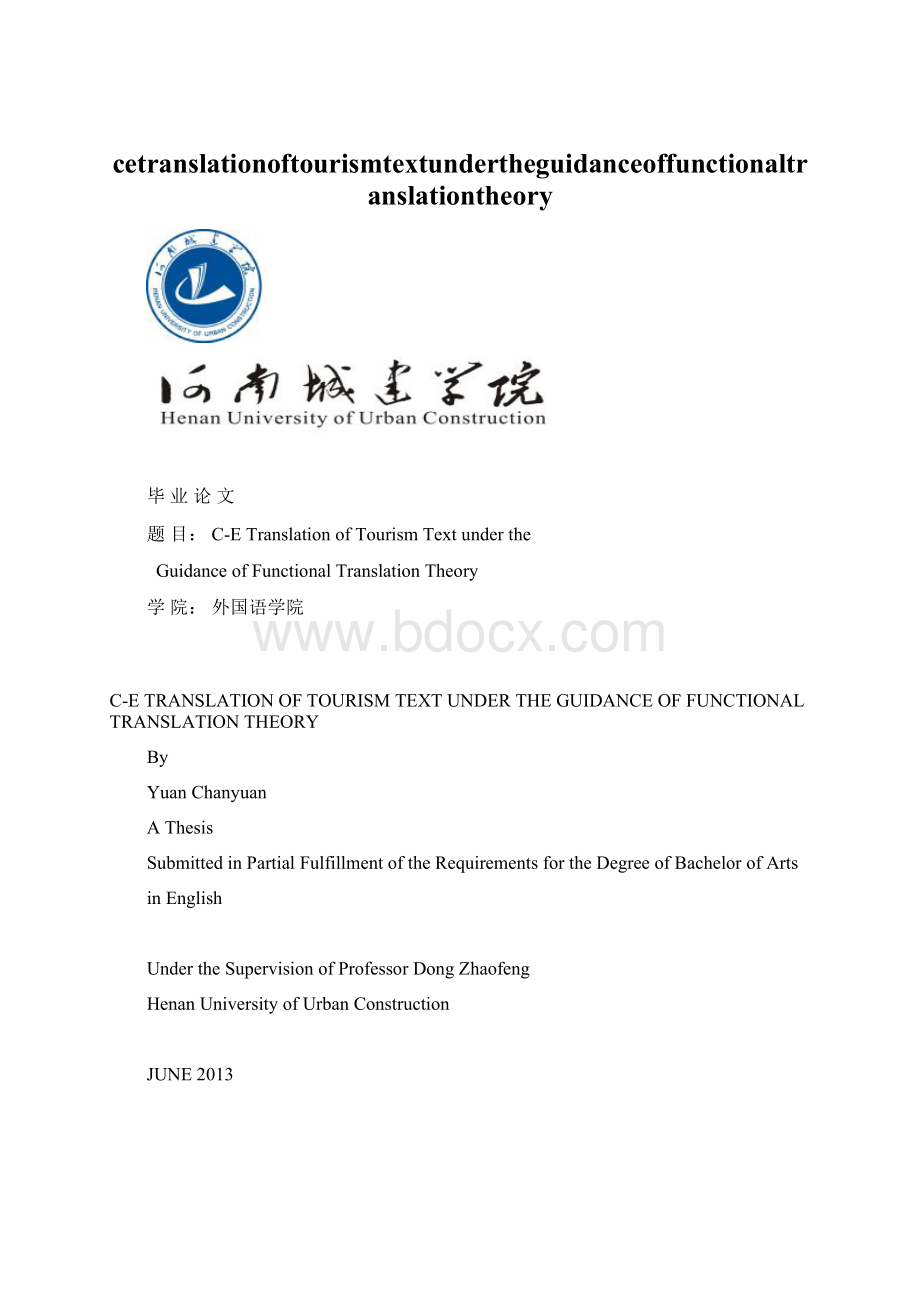cetranslationoftourismtextundertheguidanceoffunctionaltranslationtheoryWord文档下载推荐.docx
《cetranslationoftourismtextundertheguidanceoffunctionaltranslationtheoryWord文档下载推荐.docx》由会员分享,可在线阅读,更多相关《cetranslationoftourismtextundertheguidanceoffunctionaltranslationtheoryWord文档下载推荐.docx(11页珍藏版)》请在冰豆网上搜索。

学院:
外国语学院
C-ETRANSLATIONOFTOURISMTEXTUNDERTHEGUIDANCEOFFUNCTIONALTRANSLATIONTHEORY
By
YuanChanyuan
AThesis
SubmittedinPartialFulfillmentoftheRequirementsfortheDegreeofBachelorofArts
inEnglish
UndertheSupervisionofProfessorDongZhaofeng
HenanUniversityofUrbanConstruction
JUNE2013
摘要
出现在20世纪70年代德国功能翻译理论从传统角度上对语言格式的翻译有了重大突破,并把翻译解释为有意行为。
作为一个重大突破及对传统翻译理论的补充,德国功能翻译理论在翻译理论领域提供了一个全新的研究视角。
随着2008年北京奥运会和2010年上海世博会的成功举办,越来越多的外国朋友想要了解中国。
然而,旅游作为一个他国学习和了解中国的重要窗口,在中英文翻译的过程中还依然存在着一些问题。
这对中国的国际形象带来了严重且负面的影响,甚至会误导外国友人对中国的误解。
此篇论文旨在说明旅游文本翻译的重要性及技巧策略。
它不仅为旅游文本翻译提供了理论参考,还丰富了功能翻译理论的实践应用。
另外,它也让语言研究者从新的角度进行翻译的研究。
关键词:
德国功能翻译理论;
旅游文本;
翻译策略
Abstract
Emergingin1970s’,theGermanFunctionalTranslationTheoryhasmadeabreakthroughinthetraditionalperspectiveoftheequivalenceoflinguisticformsanddefinedtranslationasadeliberatebehavior.Asagreatbreakthroughandsupplementtothetraditionalequivalencetheory,ithasofferedanewperspectivefortheresearchontranslationtheory.
WiththesuccessfulstagingofBeijingOlympicsandtheOpeningof2010worldExpositioninShanghai,moreandmoreforeignfriendswanttoknowChina.However,asanimportantwindowwhichothercountriescanlearnaboutChinathroughthetourismtexts,therearestillmoremistakesontheC-Etranslationofthem.ThismayharmtheinternationalimageofChina,evenleadtoamisunderstandingaboutChinafromforeigners.Thisthesispointsouttheimportanceoftranslationoftourismtexts.Itcannotonlyprovideatheoreticalreferenceforthetranslationoftourismtexts,butalsoenrichthepracticalapplicationofFunctionalTranslationTheory,besidesitalsoprovidesanewperspectiveforlinguisticresearchesintranslationpractice.
Keywords:
FunctionalTranslationTheory;
TourismText;
TranslationPrinciplesandSkills
Contents
1.Introduction
Sincethereformandopeningup,China’stourismdevelopmenthasbeenaqualitativeleap;
thedatapredictthatby2015,Chinawillbecomethelargestinboundhostcountryandtheworld’sfourthlargestoutboundtouristcountry.Therapiddevelopmentoftourismhasbroughtopportunitiesandchallenges.Inordertobetterovercometheculturaldifferencesandpassaccuratelyandeffectivelytothereaderthetravelinformationandculturalinformation,thisarticletriestoanalyzetheC-EtranslationstrategyoftourismtextfromtheperspectiveofFunctionalTranslation,sothatforeigntouristscantrulyunderstandabroadandprofoundChineseculture,andcreateatourismbrandwithChinesecharacteristicstoattractmoretouristsandpromotethefurtherdevelopmentofChina’stourismindustry.
Withtherapiddevelopmentoftourismindustryandcommunicationsbetweenpeopleofdifferentcountries,touristmaterialshavebecomeanessentialmeansofthepublicityofcountries.InhisbookBrandleadershipatstate:
sellingFrancetoBritishTourists(Sumberg,2004:
329-353),CarolynSumbergmentionsthat“Forthefirsttimeinmorethanadecade,FrancehasbeenovertakenbySpainasBritishtouristspreferredholidaydestination.Thetouristbrochureplaysanimportantroleinthepromotionofacountryandassuchhasbecomeakeyfactorinaneconomicactivitythatgeneratessignificantincome.TherehasbeenadeliberateeffortbytheSpanishtouristboard,welldocumentedbytranslationscholars,tomaximizeconsiderationoftheappealoftheirtourismmaterialssofarasdesign,productionandtranslationareconcerned.”
ChenGang(陈刚)whohadbeenworkinginforeignaffairsandtourismofficesforalongtimepublishedhisTourismTranslationandTourGuideInterpretation(《旅游翻译与涉外导游》).Hepointsoutinhisbookthatthekeyoftourismtranslationispracticewhichrequirestheoreticalguidance.JinHuikang(金惠康)isoneofthemostfamousscholarswhodoesspecialresearchontouristtranslation.HewrotesomanybookssuchasTranslationinInterculturalCommunicationanditssequel.JindiscussesthedifferencesbetweenChineseandEnglishlanguagesandintroducesandanalysesChinesecultureandtranslation,classicliterature,art,religionfolkculturesandhowtotranslationthemintoEnglish.
Thispapermainlyincludesthreeparts:
PartOneisanoverviewoffunctionaltranslationtheory,PartTwoisthecharacteristicsoftouristtextanditsfunction,PartThreeistranslationstrategiesunderthefunctionalistapproach.Inthisarticle,itanalyzesmainlythroughlistingexamplesandspecificillustrationinordertomakeuswellunderstandandputsforwardsomesuggestionstosolvetheC-Etranslationproblems.
2.TranslationofTourismTextundertheGuidanceofFunctionalTranslationTheory
2.1AnOverviewofFunctionalTranslationTheory
2.1.1Definition
WhatisFunctionalTranslationTheory?
ThetheorywasoriginatedinGermanyinthe1970s,thefounderwasthetranslationtheoristK.Reiss,andothermajorrepresentativefiguressuchasVermeerandNord,etc.FunctionalTranslationTheorystressesthattranslationisaspecialsocialform,involvingthreetypesoftexts:
theoriginallanguage,thepatternoftextandthetranslationtext.
2.1.2ReissandHerTextTypology
K.ReissisthefounderoftheFunctionaltranslationtheory.Shefirstlycombinedthelanguagefunctionwithtranslation,anddifferedthetextindifferentfunctions,whichmakesthetranslatormoresensitivetolanguagemarkofCommunicativefunctionsandthecompositionofthefunctionaltranslationunit,atlasthelpingtranslatorhaveaproperformforaequivalentcriteriarightwiththespecifictranslationpurpose.
In1971,inherbookTranslationCriticism:
ThePotentialsandLimitation,Reissdevelopsamodeloftranslationcriticismbasedonthefunctionalrelationshipbetweensourceandtargettext(Nord,1997:
9).ReissinsiststhattheidealtranslationshouldbeequivalentbetweentheTL(targetlanguage)andSL(sourcelanguage)textwiththeconceptualcontent,linguisticform,anditcanservetorealizethecommunicativefunctionasSLtext.Justlikemanytraditionaltheorists,sheobviouslystilltakesequivalenceasthebasis.HansJ.VermeerdevelopedtheSkoposTheory,andamoresystematicandintegratedfunctionalistapproachcameintobeing.
2.1.3VermeerandSkoposTheory
ReissisapioneerofFunctionalisttheory,butHansJ.VermeermakesthemostimportanttheoryoftheFunctionaltranslationtheory:
SkoposTheory.Sincelinguisticsalonecannotsolveallthetranslationproblems,HansJ.Vermeerconsiderstranslationasatypeofhumanaction,anintentional,purposefulbehaviorthattakesplaceinagivensituation;
itisapartofthesituationatthesametimeasitmodifiesthesituation.Accordingly,hedevelopedtheSkopostheory:
“Anyformoftranslationalaction,includingthereforetranslationitself,maybeconceivedasanaction,asthenameimplies.Anyactionhasanaim,apurpose.ThewordSkopos,then,isatechnicaltermfortheaimorpurposeofatranslation.Further:
Anactionleadstoaresult,anewsituationorevent,andpossiblya‘new’object.”(Vermeer,1989:
173)
Inthetheory,thereceiver,whoistheintendedreceiveroftheTT,becomesoneoftheprimaryfactorsthatdeterminesthepurposeoftranslation.AsasharpcontrasttoReiss’sbeliefthattheSTisameasureofallthingsintranslation,theSTinVermeer’sSkopostheoryisonlyan“offerofinformation”whichmaybepartiallyorwhollytransferredtothetargetaudience.(Vermeer,1982:
12)
2.1.4NordandHerLoyaltyRule
ChristianNordintroducesthe“loyaltyrule”intofunctionalisminherefforttodefendthefunctionalistapproachagainstpotentialaccusations.“Function”herereferstothefactorsthatmakeaTTworkintheintendedwayinthetargetsituation,and“loyalty”referstotheinterpersonalrelationshipbetweenthetranslator,thesource-textsender,thetarget-textaddressesandtheinitiator(Nord,1997:
126).Byintroducingtheloyaltyprincipleintothegeneralframeworkoffunctionaltranslationtheory,Nordmanagestofindabalanceandanswerthosecriticswhoaccusefunctionalismofbeingradicalbygivingthetranslatortoomuchfreedomtodowhateverhisorherclientswishtodo,becausetheloyaltyprincipletakesaccountofthelegitimateinterestsofthethreepartiesinvolved:
theinitiator,thetargetreceiversandtheoriginalauthor.Ifthereisanyconflictbetweentheinterestsofthethreepartnersofthetranslation,thetranslatorhastomediate,andwherenecessary,toseektheunderstandingofallsides.
2.1.5ThePossibilitiesoftheFunctionalistApproachinTourismTextTranslation
Asakindofpracticalwriting,tourismtextshaveclearpurposesandfunctions,sothefunctionalisttheoryisquitesuitableandcanbeappliedtoit.Inordertorealizethepurposesoftourismtextstranslation,thetranslatedtextmustmeettheconventionsofthetargetlanguage.Thispaperlaysemphasisontheapplicationofthefunctionalisttheoryinthetranslationoftourismtranslation:
1.Fulfilltheintendedfunctionsofthesourcetext;
2.Faithfulandloyaltotheoriginaltext;
3.Avoidjargonsandambitious;
4.Removeculturalbarriers.Thenaccordingtotheseprinciples,functionaltranslationisselectedasthetranslationstrategywhichincludesliteraltranslation,freetranslationanddomestication.Abundantexamplesareofferedtodemonstratetheapplicationofthefunctionalisttheoryintranslationtourismtext.Therefore,thefunctionalisttheory,asapracticalformoftranslationtheory,canbeappliedtothetranslationoftourismtexts.
2.2ABrie